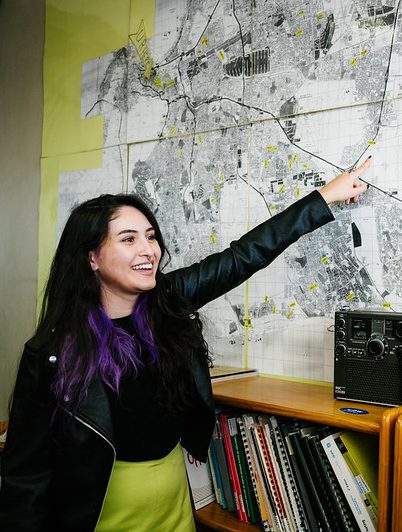RESOURCES
2024-03-13
How to Develop Networking Skills
Networking is such a valuable skill for getting jobs and growing your career.
It also provides you with a way to learn more about your field of interest.
Published by Tilting Futures

Networking is an important part of getting a job. In fact, it’s estimated that 80% of professionals consider networking crucial to their success. About 70% of jobs are never publicly posted, and those jobs are then filled through networking. So developing networking skills is an important way to grow your career and to cultivate meaningful professional relationships. Read on to learn more about networking skills, how to develop networking skills, and how Take Action Lab can help you develop networking skills.
Why Networking Skills Matter
Networking is cultivating positive professional relationships. It’s where you take the time to get to know the people you work with and people at other companies. Networking can provide obvious benefits like job opportunities and career growth. For example, let’s say you attended university networking events while in school, and then someone you met later reached out about hiring at their company. If you then get that job, you just advanced your career through networking. The same thing can happen with promotions and moving your career forward.
Even if you’re not job searching just yet, networking can help you with career exploration and learning about potential future paths. Through networking, you can meet interesting people who have perspectives and skills you don’t. Those connections can help you learn more skills and broaden your understanding of the world. These skills and perspectives can later open doors for you and provide new and interesting opportunities down the road.
How to Develop Networking Skills

Since networking skills can be so valuable, how do you develop them? We’re going to give you a few tips for developing your networking skills, expanding your network, nurturing your professional relationships, and overcoming networking challenges. Here are two tips for how to develop networking skills:
Developing communication skills
Communication is valuable for everything you do, especially networking. Being able to communicate concisely and clearly is important for cultivating relationships and advancing your career. Networking is all about talking with other people—whether in-person, over the phone, over email, or any other type of communication—so being able to communicate well is how you’ll be able to build connections. How can you develop these communication skills? Here are some tips:
- Active listening. Paying deliberate attention to everything people say in a conversation will show that you care about what they’re saying and help you really connect with that person.
- Non-verbal communication. Pay attention to the signals you’re sending with non-verbal communication. Keeping your arms crossed while talking to someone might signal that you’re not interested in what they’re saying. Instead, make your body language more open to signal that you’re more receptive and welcoming.
- Articulation. Practice articulating your thoughts clearly. Consider crafting an elevator pitch to help articulate your experience and plans to someone else.
Cultivating authenticity and personal branding
Knowing who you are is an important part of networking. You have interesting and unique gifts and experiences that can provide other people with value. The goal is to be able to convey that authentically. One way to do this is to build your own personal brand where you’re able to convey who you are. Here are a few tips:
- Discover your unique talents. Take time to delve into your strengths and skills. Unearth what sets you apart, for creating a brand requires knowing what makes you exceptional.
- Reveal your genuine self. Embrace authenticity, allowing your values to shine through. Share what truly matters to you and the causes close to your heart.
- Reflect on your core strengths. Whether crafting an elevator pitch or refining your LinkedIn profile, emphasize your distinctive abilities. Paint a vivid picture of what defines you, showcasing your talents and values.
- Connect deeply through stories. Go beyond skill listing – share experiences that reflect your strengths and values. Forge connections on a human level, illustrating how your unique abilities align with your passions.
Expanding Your Network

To truly network, you need to build a community of people you’re connected with professionally with. Here are two ways you can work on actively expanding your network.
Leveraging online platforms and social media

Social media is a space where you can connect with people all over the world who share similar interests and who can help you grow. Here are a few tips to help you get started really leveraging social media:
- Work on your profile. Include a professional profile picture, include your work and schooling information in a way that’s easy to read, and maybe get someone to look at your profile to provide you with tips.
- Engage with communities. Get involved with communities that are relevant to your interests. There are often social media spaces for a variety of interests and industry groups. Engaging with those communities can help you meet new people.
- Create content. When you create high quality content, you’re producing something of value that can help you engage with other people and start conversations.
Attending events, conferences, and informational interviews
Events and conferences are a great way to meet new people. These events might be specific networking events, but they don’t have to be. Most industries have conferences where attendees are able to learn about important information while also making connections. There are also less formal opportunities to connect with people in your field of interest. You might also check out meet-ups in your area, volunteer groups, or school clubs if you’re still a student.
You might also consider doing informational interviews. These interviews are not about applying for a job, but provide you a chance to talk with professionals in your field of interest. You’re able to learn more about how you might progress in your career and gain a new person in your network.
Nurturing Relationships

Once you meet new people, that’s not the end. True networking involves nurturing relationships, so the people you’re connecting with are people you actually know. That’s when networking can turn into job opportunities and career growth. How can you nurture those relationships? Here are our suggestions.
Maintaining professional relationships
To build and maintain a relationship, it’s important to show genuine interest in the other person and to work on building rapport. Listening and being interested in someone else will help you build a real relationship. Focus on staying connected and reciprocating communication.
Mentorship and collaboration
One great way to really build relationships is to get involved in mentorship. A mentor is someone who can show you the ropes of your career, but you’ll also want to find mentorship opportunities that are mutually beneficial. Find a mentor who you can do great collaborative work with, and together you can progress your career and create something of real value.
If you’re looking for a great way to find a mentor, Take Action Lab, an immersive learning program by the nonprofit Tilting Futures pairs you with an expert in the field to help you learn.

Join a global networkk of changemakers
See how Take Action Lab could align with your goals.
Overcoming Networking Challenges

There are challenges with networking that can make it difficult to do. One challenge is networking anxiety. Being someone who’s uncomfortable with networking, shy, or highly introverted can make networking appear nearly impossible. What can you do about that? Here are a couple of tips for how to socialize for introverts and others who are anxious about networking:
- Practice. You can practice socializing and building relationships, so it’s not so daunting when you try to do it in a networking situation. Prep your elevator pitch in advance and practice it, so you’re able to give it easily.
- Fake it until you make it. While you might be nervous, you don’t have to show it. The reality is, most people are, its all about how you can best present yourself to people.
- Try digital connections. Connecting digitally can be a great way to network without some of the stress that can come with face-to-face interactions.
Another challenge you could face is trying to network in a culture you’re unfamiliar with. You might worry about accidentally offending someone or not understanding the cultural norms. What can you do? Strive to practice cultural sensitivity and open-mindedness. You can do research to learn more about the culture. And always try to practice curiosity before judgment if you come across customs that you’re unfamiliar with.
How Take Action Lab Helps Develop Networking Skills

If you’re a young person looking for networking opportunities, Take Action Lab can help you develop those skills. Here’s how Take Action Lab can give you the networking skills you need:
- Access to Diverse Professional Networks:
- Apprenticeships with Take Action Lab provide you with opportunities to connect and network with professionals from various industries, companies, and positions. You get to work alongside them and learn more than you could on your own.
- Learning from Experienced Professionals:
- During apprenticeships and gap semesters have the chance to learn directly from experienced professionals.
- These professionals can provide guidance, insights, and industry-specific networking advice to help apprentices develop their networking skills.
- Plus your mentor will be a crucial part of your network as you grow your career.
- Enhancing Communication and Interpersonal Skills:
- Through daily interactions and teamwork, apprenticeships help develop effective communication and interpersonal skills.
- These skills are crucial for networking, as they enable apprentices to connect and engage with others confidently.
- You also get to connect with like-minded students from around the world—both with the cohort during the program and as part of the alumni network after graduation.
Take Action Lab is for students aged 17–21 and provides a way to gain crucial networking skills.
Conclusion
Overall, networking is such a valuable skill for getting jobs and growing your career. It also provides you with a way to learn more about your field of interest. It’s important to go out and meet new people and to develop those connections into real mutually beneficial relationships.
If you’re a student looking to develop networking skills, Take Action Lab could be a great fit for you.


